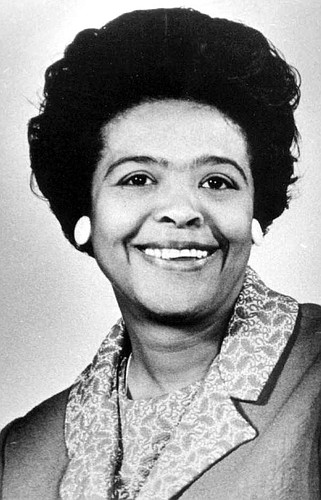
For the first time in the honor’s 33-year history, the Jacksonville Bar Association this year presented its Liberty Bell Award posthumously.
The 2020 recipient, Mary Littlejohn Singleton, died in 1980..
The JBA presents the annual Law Day recognition to someone who isn’t an attorney but has made significant contribution to the legal community and community at large.
A graduate of Florida A&M University who began a career in education as a public school teacher in Duval County, Singleton represented Jacksonville residents as one of the first women elected to City Council. She was elected in 1967 along with Sallye Mathis.
In 1972, voters elected Singleton to the state House of Representatives and re-elected her in 1974.
She then was director of the state Division of Elections and was on the ticket as lieutenant governor in 1978 when former Gov. Claude Kirk unsuccessfully sought a second term in office.
Chelsea Harris, chair of the JBA Law Week Committee, said Singleton reflects the theme of this year’s national Law Day observance established by the American Bar Association: The 100th anniversary of the 19th Amendment to the U.S. Constitution that gave women the right to vote.
“She was able to set the path for women, including African American women, to participate in voting and leadership,” Harris said.
The Liberty Bell plaque was presented to Singleton’s granddaughter, attorney Leslie Scott Jean-Bart.
Jean-Bart said she knows what her grandmother would have said in accepting the Liberty Bell:
“Thank you for this prestigious award. It was an honor to represent the people of Jacksonville in a meaningful way to provide them with quality representation and access to the government and services needed to live a better life. Throughout my years of public service, I stressed the importance of citizens working together and from within the system to effect change. This was often done by stepping outside my comfort zone as a Catholic black woman and being open to building relationships with others,” she said.
“We should all remember that our willingness to work together across religious, racial and gender lines makes us stronger as a nation and lifts up all communities together.”
Jean-Bart’s parents divorced when she was a year old. She, her sister and her mother moved in with Singleton.
Jean-Bart was 6 years old when her mother died and Singleton became her guardian.
“My grandmother was an important part of my life,” Jean-Bart said.
She said living with Singleton, she grew up in a color-blind environment.
“She was a hostess and entertained all people in her home. That was the norm. People trusted her because they knew she cared about them and about the community,” Jean-Bart said.
Singleton also instilled a regard for education.
“I was raised with the understanding that I would go to college. I was a very shy child. That I am a lawyer and as vocal as I am would tickle her,” Jean-Bart said.